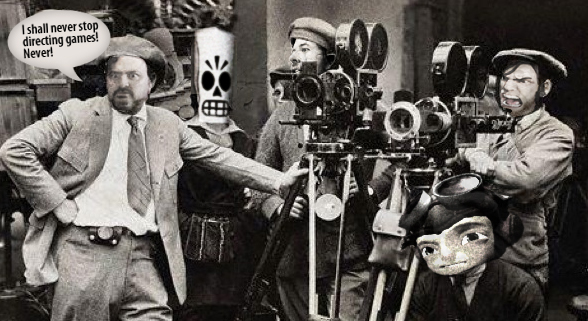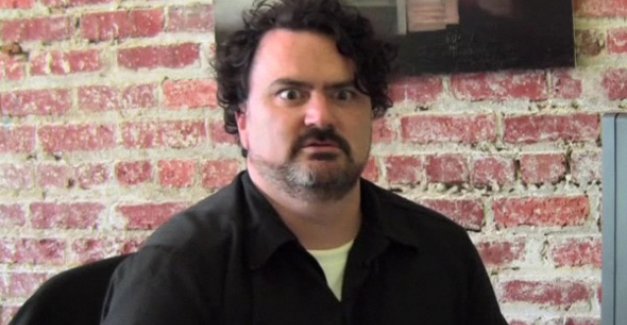Articles

Tim Schafer Should Never Stop Making Video Games Page One
Tim Schafer is routinely celebrated for his creativity, wit, and storytelling skills, but his credentials as a gamer aren’t necessarily emphasized, even though they arguably play as influential a role in his projects. Ever read an interview with Schafer where his childhood is discussed (there are surprisingly several out there at this point)? The guy was feeding a Magnavox Odyssey addiction before a great many of us were even in the womb, and was so obsessed with his Atari that he attempted to write his own games for it in BASIC. When interviewed for his fateful job at Lucasfilm Games, he was able to claim a familiarity with their earlier titles like Ballblazer and Rescue on Fractalus!. The probability is low that he’d played these games as a preparatory measure.
In the mid-90s after Full Throttle, Schafer toyed with the idea of his next title being in the mold of Warcraft. Among the influences he cites for the mechanics of Grim Fandango are Bioforge and Alone and the Dark. Psychonauts is in part a tribute to Mario and Zelda, and Schafer has namechecked the underappreciated The Last Express as inspiration for including avoidable character bits in the campground. The gameplay conceived for Brutal Legend is a love letter to the pioneering (and little known) console RTS Herzog Swei for the Sega Genesis.

Would it seem believable to you that this same guy is secretly a frustrated screenwriter or novelist who wound up involved with games by mistake, one that needs correcting?
Some folks have apparently convinced themselves of nothing less. A few months back, a news story we ran caused something of an uproar, the definition of "uproar" on Mojo being the registration of more than ten (10) comments by stirred readers – a true phenomenon. We reported on a brief article by Alex Riviello on CHUD called "Tim Schafer Should Never Make Another Video Game.” Despite the incendiary title, the author describes himself as a longtime fan of Schafer’s body of work, and in the article expresses sincere regret with the direction it has taken in recent years.
The through line of Riviello's rant is this: “A Schafer game simply cannot rely on gameplay.” His argument is that the major selling point of Schafer's games tends to be the plotline and characters, with every other aspect, which he seems to conveniently lop into the term "gameplay," being inferior to the point of simply getting in the way of what he sees to be the games’ real strengths. What was the seminal Grim Fandango, he insinuates, but an amazing experience impaired by irritating keyboard controls that needlessly broke away from the established point ‘n click mechanic? He goes on to draw the conclusion that instead of continuing to “try” to make games, Schafer should apply his writing strengths strictly to the cinematic or literary medium, where his talents presumably converge better.
For me, Riviello’s conclusion is patently ridiculous, and yet it must be acknowledged that his is not exactly a lone voice. An outspoken belief that Tim has moved away from his roots at the expense of his vision is one that has persisted in some circles ever since Tim left LucasArts to found Double Fine. These complaints tend to be laced with the unmistakable bitterness that Tim simply isn’t working in the same genre that the vocalizer would prefer.
Riviello speaks of the “experience” as being the real draw of Grim Fandango and Psychonauts, as if that’s something easily lent to isolation when deconstructing the games. But if it is definable, what exactly constitutes that experience that he thinks it could be so easily recast to a non-interactive format? The idea that Grim Fandango could have worked as a movie is of course plausible; the idea that it could manage the transposition without a significant loss to what makes it so special is completely naïve and truly overlooks some of the game’s most impressive, and non-translatable, achievements.
Given a game where the focus is the world, the story, and the characters, as is the case with most of Schafer’s projects to date, it’s useful, and probably more accurate, to view gameplay as nothing more specific than the way the player experiences the game. This would encompass everything from the mechanics of the exploration to the method of making progress (in an adventure game, this is often puzzle solving) to the very architecture of the interactive environments.
Think that’s abstracting things too much? Consider the presentation of Grim Fandango, with which the much maligned control scheme is intrinsically married. Grim is a story told in the tradition of a film noir, and the leap to 3D serves that stylistic choice. The decision to have the player drive the character granted a cinematic freedom that simply would not have been possible with the tech of previous games.
Whether you’re over the moon for them or not, Grim Fandango’s controls are clearly about immersion, not some contrarian exercise in disrupting an established control scheme. 3D environments open up a world of visual composition possibilities for the designers and artists akin to setting up camera angles on a movie set. In a 3D world, using point ‘n click for character movement, while certainly possible (as in Telltale’s first several series), forces the designer to either restrict the view of the game world to a limited number of relatively wide angles that favor the ground, or run the risk confusing the player’s sense of direction when throwing to a new shot. With direct control, forward is forward, broadening the feasibility of interesting composition choices.
The potential that the Grim team saw in taking the game to this new canvas didn’t amount to just gimmicky visual flourishes, although those certainly aren’t denied, but was an extension of the game’s fundamental vision, something natural to the flavor of the story. While the elegance of point ‘n click may understandably be missed when you’re unintentionally bumping Manny against a wall or encountering some other maneuvering frustration that the far more guided realm of click-and-wait protects you from (and is of course a side-effect of Grim being a first), nothing short of blindness could lead one to believe that the game’s deliberately text and cursor-free interface was so thoughtlessly applied that it could simply be swapped out for another. I’m sure Grim would have made a great movie, but isn’t that a weird thing to lobby for when the game essentially has all the advantages of a movie plus benefits that can only be reaped with interaction?
Would we have had this moment in the Grim Fandango movie?
